Over the last few years, I’ve been collecting examples of metagames — not the strategy of metagaming, but playable games about videogames. Most of these, like Desert Bus or Quest for the Crown, are one-joke games for a quick laugh. Others, like Cow Clicker and Upgrade Complete, are playable critiques of game mechanics. Some are even (gasp!) fun.
Since I couldn’t find an exhaustive list (this TV Tropes guide to “Deconstruction Games” is the closest), I thought I’d try to pull one together along with some gameplay videos.
This is just a starting point, please post your additions in the comments or email me and I’ll add them in. Note: I’ve tried to stay away from specific game parodies (like Pong Kombat or Pyst), and stick to games that comment on game design, mechanics, or culture.
Abusive Games
Most bad games don’t try to be bad. But these games deliberately test your patience by taking a single game mechanic and make it hard to endure. For more information about abusive game design, see this academic paper and presentation by Douglas Wilson and Miguel Sicart at the University of Copenhagen.
Penn & Teller’s Smoke & Mirrors (Sega CD, 1995). Download. Like their earlier Cruel Tricks for Dear Friends video from 1987 — see Vidi Kopy or Super Kleener for meta-VHS examples — Smoke and Mirrors was a collection of small pranks that used unique aspects of the medium to let buyers play tricks on their friends. In Desert Bus, the most notorious of the mini-games, players drive a tour bus on a mind-numbing eight-hour trip from Tucson to Las Vegas. Driving off-road gets you towed back to Tucson in real-time, making it difficult to cheat. And if you manage to complete the trip, you get one point. In interviews, Jillette said Desert Bus was their attempt to make the most mundane, realistic game ever, a direct response to the Clinton Administration’s fight against violent games in the mid-1990s.
Bastet: Bastard Tetris (Windows/Linux, 2005). Play online. Federico Poloni’s malevolent AI always sends the worst possible brick. The Tetris God hates you. Related: Hatetris.
I Wanna Be The Guy: The Movie: The Game (Windows, 2007). One of the hardest games ever made, Michael “Kayin” O’Reilly’s “nail-rippingly difficult platform adventure” pays homage to countless 8- and 16-bit era games. If you play it in the easiest setting (“Medium”), your characters has a pink bow in his hair and all the save points are renamed from “SAVE” to “WUSS.”
The Unfair Platformer (Flash, 2008). A frustrating, and not very fun, platformer with a very unreliable narrator. Have fun in Sunshine Mountain.
Janey Thomson’s Marathon (Flash, 2009). Speed run. Ostensibly made for the 1984 Olympics, this Flash game made for TV channel E4 by Rob Manuel and Matt Round asks players to run a 26.2 mile marathon in real-time, Track & Field-style. Here’s video of one poor bloke beating the game, after nearly three hours of button-mashing.
Steamshovel Harry (Flash, 2009). Sometimes, the tutorial is the best part of the game. Original music by Brad Sucks.
Tetris HD (Flash, 2009). It can take upwards of 15 minutes to complete a single line.
Minimalist Games
The flipside of abusive games — games so obvious that they’re barely games at all.
Pick Up the Phone Booth and Die (Z-code, 1996). Play online or download. Rob Noyes’ classic piece of minimalist interaction fiction. Despite the title, it’s actually winnable in two moves.
Progress Quest (Windows/Linux/Web, 2002). Eric Fredricksen’s cult favorite “streamlines the more tedious aspects” of modern RPGs by cutting out the middleman: the player. There’s no interaction at all, just watching your character stats increase as the game plays itself in progress bar status messages. Try it in your browser. See also: Statbuilder Classic from 2008.
Quest for the Crown (Flash, 2003). Paul and Nate Redcloud’s parody of 8-bit RPGs, complete with forced narrative, epic ending music, and an official strategy guide. Cameo by Peter Cetera.
Don’t Shoot the Puppy (Flash, 2006). A game of inaction.
You Have to Burn the Rope (Flash, 2008). Gameplay. Kian “Mazapán” Bashiri turns a walkthrough into a game, with an original song by Henrik Nåmark.
4 Minutes and 33 Seconds of Uniqueness (Windows, 2009). Petri Purho, creator of Crayon Physics, created this experimental program that’s barely a game. Your goal is simply to be the only other person running the game online for 4 minutes and 33 seconds straight. If anyone else starts it up during that period, the game quits and you lose. No interaction, just a giant black-and-white progress bar.
Super PSTW Action RPG (Flash, 2009). The “PSTW” stands for “Press Space to Win,” which is all you need to know. Don’t miss Dot Dot Dot, the hilarious dramatic reading of a frustrated player’s review of the game.
Progress Wars (Web, 2010). Jakob Skjerning’s modern HTML5 click-fest describes itself as “Like Progress Quest for people who aren’t old.”
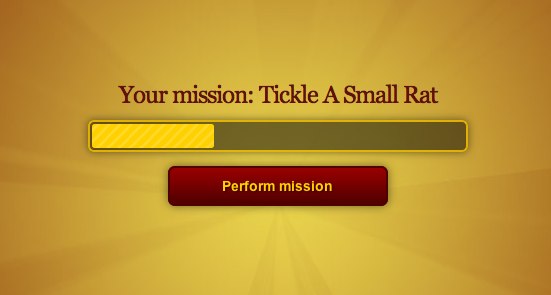
Godville (Web/iOS, 2010). Inspired by Progress Quest, Godville is a “massively-multiplayer zero-player game” that requires no interaction to play. Even when you’re not playing, your character’s busy wandering the countryside, fighting battles, and leveling up, with your character’s actions summarized with text largely created by the community. It’s free for iPhone/iPad and currently invite-only beta on the web.
Game Mechanics Gone Wild
These games take a single game mechanic or cliche and blow it out, usually for comic effect. The result is a game that’s not so much about the experience, but about what actually makes a game fun or not.
Retro Sabotage (Flash, 2007-Present). A collection of brief minigames, each using elements of a classic game as its backdrop. In an interview, the pseudonymous creators behind the site said, “The idea is to use games against themselves to have gamers think about the medium.” Highlights: Mario escapes the NES, the Cold War context of Missile Command, Pong 2.0 parodies game tutorials, and Twenty Lines, which combines Tetris with Kubrick’s 2001. (Read Emily Short’s thoughtful column about the game.)
Achievement Unlocked (Flash, 2008). John “jmtb02” Cooney brilliantly lampoons the achievements craze, heaping endless awards on players for doing the most mundane tasks — starting the game, muting the sound, or not moving at all.
Upgrade Complete (Flash, 2009). Directly inspired by Achievement Unlocked every element of this game can be upgraded, from the graphics and sound to the menu buttons and copyright notice. Even the ending is lame at first, berating you for choosing a game based on the complexity of its upgrade system instead of how fun it is… but you can always upgrade to a happier ending.
Free Will: The Game (Flash, 2009). Marcus “Raitendo” Richert made several games about elements of gaming, starting with this experiment that injects a dose of reality into a simple Gameboy-era platformer.
You Only Live Once (Flash, 2009). In most games, death is a temporary setback. Here, Raitendo made it as permanent as possible. Your girlfriend mourns your death, the enemy arrested, and a memorial erected in your honor… but no extra lives. After playing through, try reloading the page or switching browsers. (This trick was reused to great effect in One Chance.)
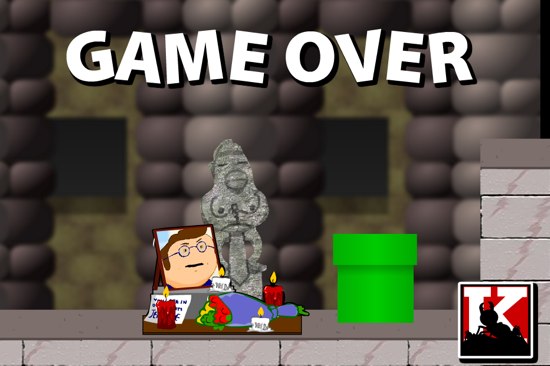
Mr. Destiny’s Adventure (Flash, 2009). Noyb’s riff on Super Mario Bros. seems broken at first, but it’s intentional. Are you playing the game, or is it playing you?
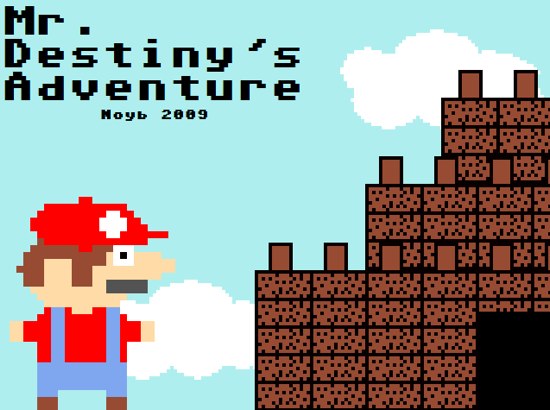
Cow Clicker (Facebook Game, 2010). Ian Bogost’s Facebook game about Facebook games is “partly a satire, and partly a playable theory of today’s social games, and partly an earnest example of that genre.” To his partial dismay, it became the most popular piece of art he’s ever made. Last week, Bogost extended the game into a platform, complete with API, widgets, an iPhone app, new Facebook game, and Cow Clicker-branded search engine.
Violent Games
Commentary about violent videogames or those who protest against them.
Super Columbine Massacre RPG!, (Windows, 2005). Created by a Colorado college student, this polarizing game let players loosely reenact the Columbine shootings as Eric Harris and Dylan Klebold. It was met with extremely mixed reactions, and created a storm of controversy when it was accepted and later pulled from the Slamdance game competition. In 2008, Ledonne produced Playing Columbine, a documentary about the controversy. While flawed, it’s still provocative experiment. Clive Thompson wrote in his Wired review, “It uses the language of games as a way to think about the massacre.” Watch the complete run-through.
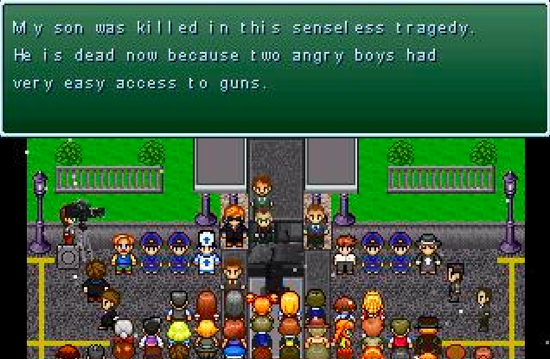
I’m O.K.: A Murder Simulator (Windows, 2005). In 2005, disbarred attorney/videogame activist Jack Thompson wrote “A Modest Videogame Proposal,” a satirical open letter offering $10,000 to the first developer to create and release a game in which game developers were murdered. Three talented developers took up the challenge, creating a comically violent side-scroller that fulfilled Thompson’s spec to the letter. He never paid up. Watch the complete playthrough.
Close Range (Flash, 2009). The Onion News Network’s parody of violent games was accompanied by a standalone website and a truly terrible playable game.
Murder Simulator (Unity, 2010). Northern University Illinois student Andy Saia’s student project is a response to the post-school shootings debate about violent videogames in politics and the mainstream media.
Gaming Culture
These games all reflect on game development and gamer culture.
The Game Paradise: Master Of Shooting (Arcade/Sega Saturn, 1995). This Japanese shoot-em-up takes place in an arcade, where characters from other Jaleco games must defend themselves from a range of game-related enemies, including cocktail cabinets, printed circuit boards, and pinball machines. In one stage, an 8-bit CPU captures the Saturn’s 32-bit CPU and forces the graphics down to the Space Invaders era.
Segagaga (Dreamcast, 2001). Only released in Japan, this strange game parodied the console wars, with players taking control of Sega in a desperate attempt to try to regain marketshare from DOGMA (a thinly-veiled Sony). In an interview with the game’s creator, Edge Magazine revealed it was secretly developed for two years with a marketing budget of only $200.
WarioWare, Inc. (Nintendo DS, 2003). WarioWare is a game loosely structured around making and playing games. After hearing that videogames are a huge business, Wario buys a laptop and starts making games. Frustrated by the time commitment, he hires friends to churn out as many “microgames” as they can. One character, 9-Volt, bases all his games on Nintendo classics.
Retro Game Challenge (Nintendo DS, 2007). This is like the Inception of games: a game where you play videogames to appease a character based on a man who plays videogames on a long-running Japanese television show. If you get stuck, read fictional gaming magazines to get hints to beat the fictional NES games. Oh, Japan.
Rara Racer (Windows/Mac, 2008). Increpare parodies YouTube playthroughs, with self-referential commentary, popup windows, and other unexpected intrusions. It really has to be played to be appreciated.
First Person Tetris (Flash, 2010). David Kraftsow fixes each Tetris block in your view, revolving the entire world around it — NES, TV and all.
Game Dev Story (iOS/Android/PC, 2010). Run your own videogame company over a 20-year span in this highly-addictive RPG/simulation, developing a string of fictional games for slightly-fictionalized consoles (“PlayStatus,” “Intendro DM,” “Uranus”), with the help of some familiar names (“Gilly Bates,” “Steven Jobson,” “Shigeto Minamoto”).
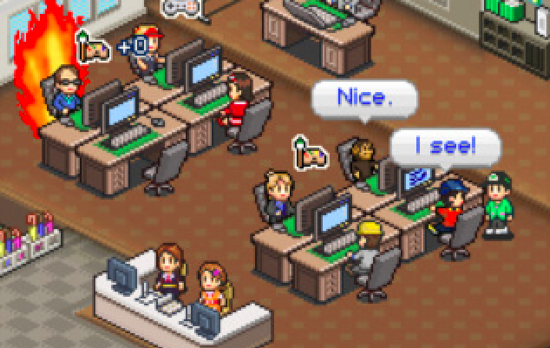
Passage in 10 Seconds (Flash, 2010). Raitendo made three short, playable parodies of artsy games, starting with this direct parody of Jason Rohrer’s acclaimed Passage. He followed up by poking fun at Abstract Art Game in 10 Seconds and Experimental Gameplay in 10 Seconds.
Great Game 1/5 (Flash, 2010). A parody of Internet game reviewers, this game constantly berates the game designer with one-star reviews for every one of the game’s flaws.
And More…
What did I miss? Post them in the comments, send me tips on Twitter, or email/IM me.
February 3: Wow, thanks so much to everybody who sent in suggestions. I now have more games to add than in the original entry! As a result, I’m going to do a long second post with all of them, which I’ll publish next week. Thanks.


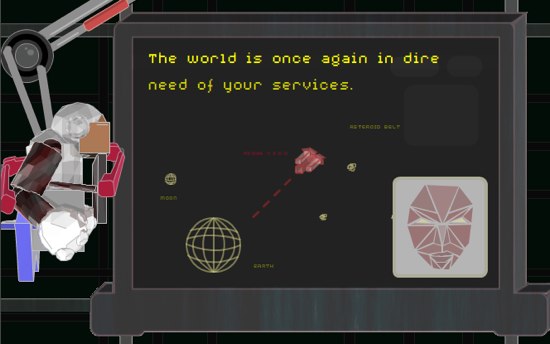

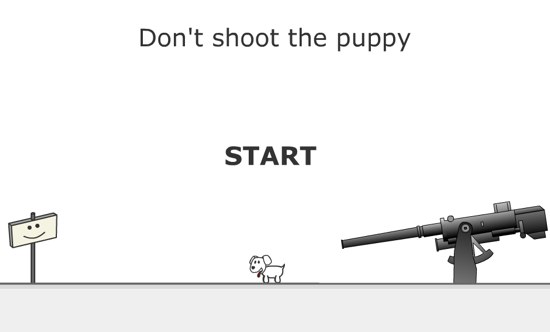

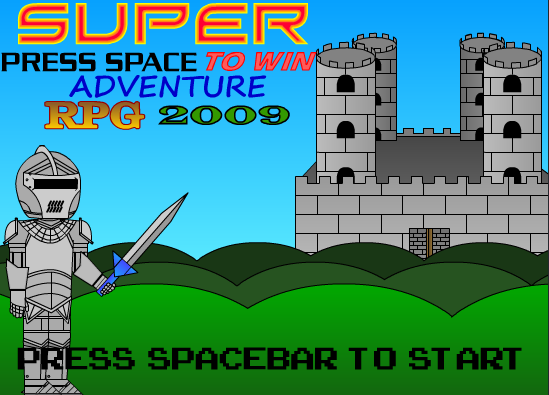
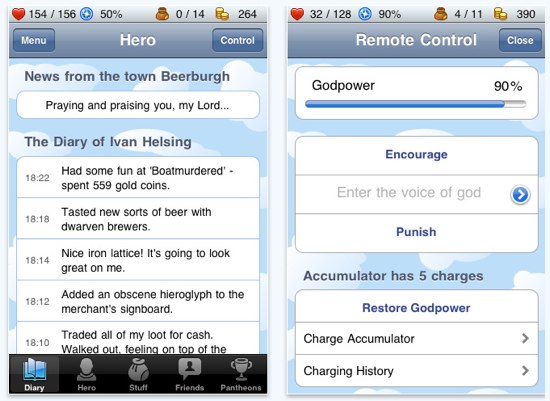
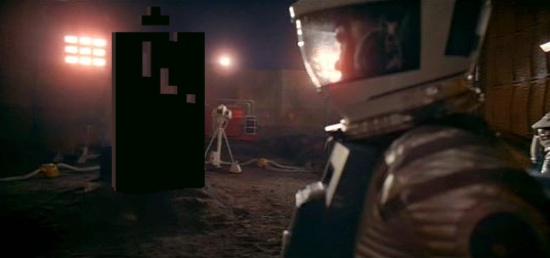
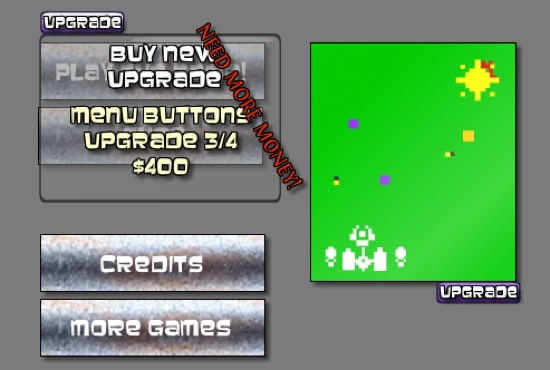
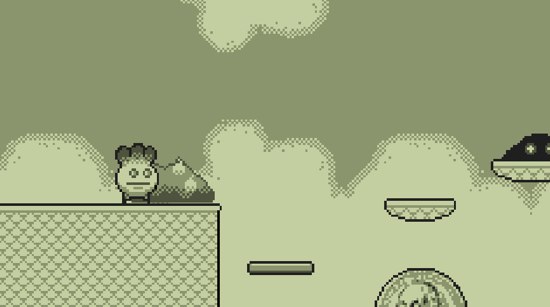
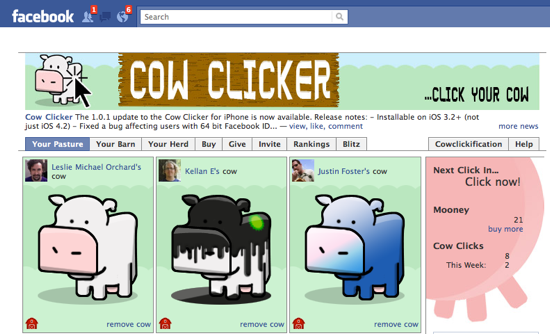
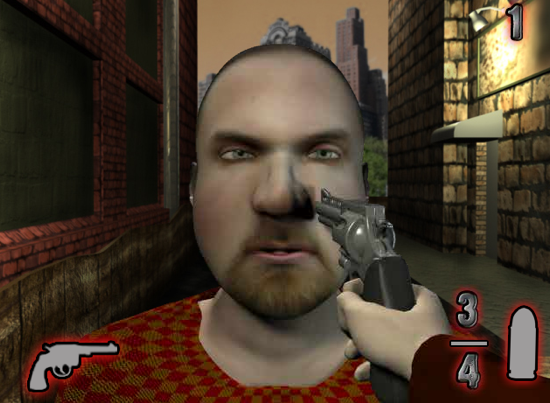
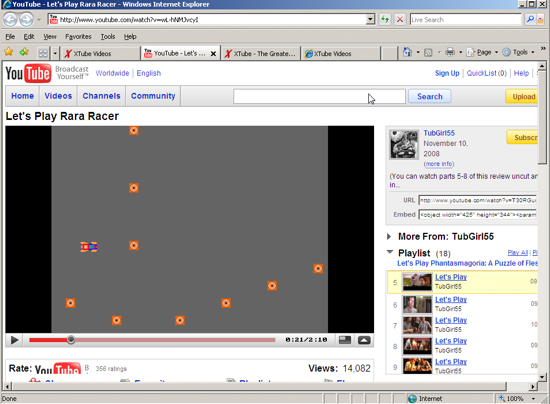

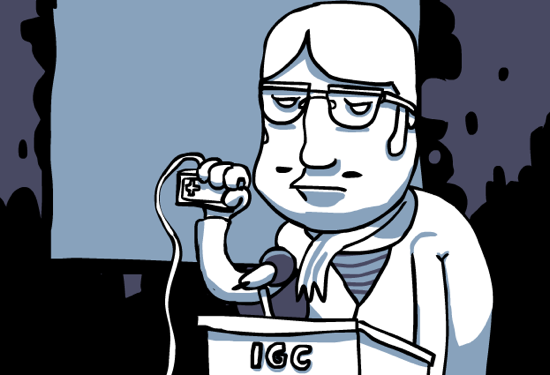
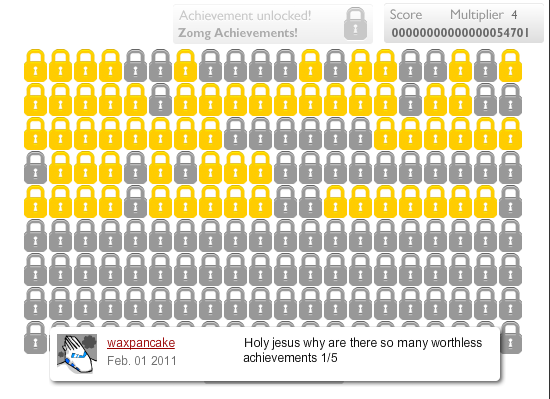
Awesome list! I’d also suggest Tetris Hell, inspired by the xkcd comic.
Zen MOO (described here: http://www.wired.com/wired/archive/1.03/flux.html ) was a classic in the genre. The goal was to stay connected and never “say” anything. To avoid cheating you were asked captcha-like questions every once in a while. Other than that, you were asked only to sit and be still. I found it quite relaxing.
I’m not sure which category this would fall under, but I once wrote an ‘Idea’ post about a falling-blocks game where only one block falls at a time. When you make a tetromino, it disappears. One of my readers actually turned the idea into a fairly decent flash game (that strangely isn’t loading for me right now).
My original post: http://www.ironicsans.com/2007/12/idea_tetris_one_brick_at_a_tim.html
My followup post: http://www.ironicsans.com/2009/01/i_wrote_it_you_made_it_montris.html
The game: http://zarat.us/tra/online-games/sirtet.html
I’m not sure who authored it, but there is a playable version of xkcd’s Tetris Hell:
http://www.swfme.com/view/1046212
I think mySQLgame is a great example of this – and the gameplay is actually well thought out and fairly addictive, too.
From a XKCD strip : Hell Tetris http://www.kongregate.com/games/banthar/hell-tetris
This is a really fun post. Thanks!
Atheist – http://www.zefrank.com/atheist/ – could go in the Minimalist Games category.
An obvious omission here would be the “Matt Hazzard” games (e.g. Eat Lead: The Return of Matt Hazzard) , which purport to be sequels to 80s PC game like Commander Keen, that doesn’t actually exist in real life.
Of course, they failed by not being very good.
You forgot The Linear RPG:
http://www.sophiehoulden.com/games/thelinearrpg/
A classic in the genre. Great list, though.
I can think of one: there’s the red-button game (forget the name) associated with SMBC that’s just pressing the red button over and over to get points
Surely QWOP belongs on the abusive games list:
http://www.foddy.net/Athletics.html
How about Viewtiful Joe?
SimCity came about because in the late 1980’s Will Wright found his level editor more interesting than the games he was playing: http://www.gamespot.com/features/maxis/page2.html
Wow, thanks for compiling this.
One of the most common meta-games I play is to pause (literally or figuratively) pretty frequently and figure out what I could have/could be doing right this moment rather than playing whatever video game happens to be at hand. It makes for fairly short gaming sessions.
I’m rather surprised Kingdom of Loathing isn’t mentioned here. Not every element of the game is intended to be a meta-gaming experience, but thats definitely a large part of it. A few highlights:
In level 10, you adventure in the “Penultimate Fantasy Air Ship” which is largely a parody of Final Fantasy games. Among other things, monsters you will fight include “a series of random encounters”, a “burley sidekick”, a “quiet healer”, a “spunky princess” and of course, a “protagonist”.
If you acquire a Rogue Program familiar (tron reference), he will sometimes drop game grid tokens, letting you go to a video arcade to play arcade games such as Meteiod (metroid satire), Fighters of Fighting (Street Fighter, Mortal Kombat, etc), Dungeon Fist (Gauntlet), etc.
And if you want to talk about meta-meta-gaming, in the 2010 christmas content, there was a series of encounters called “best game ever”, which is a self-referential parody of the game itself.
This really only scratches the surface. The Zelda, Mario Bros. and Castlevania franchises are also parodied, as are many RPG games.
There was a second Retro Game Challenge but only released in Japan under the name Game Center CX 2.
You left out SPISPOPD! (I would have tweeted this, but Twitter is of course broken.)
here’s one you missed
http://www.sophiehoulden.com/games/thelinearrpg/
The original WarioWare came out on the Game Boy Advance, not the DS.
The first thought I had when reading the term ‘meta-game’ was game frameworks – games that create or involve other games.
What you describe mostly are games that reflect about games (themselves or others) and their concepts. Maybe we need a different term for one of the two.
Examples for my kind of meta-games: Nomic – 1000 blank white cards – sf0.org – Calvinball. None of them is explicitly meta in the sense that they *only* rely on other games being played, but in creating their own rules and tasks, they become all games at once, and spark subgames.
Ze Frank’s “Atheist”: http://www.zefrank.com/atheist/
While it introduced some incredibly clever game mechanics of its own, I’d submit Braid as a meta-game. I wouldn’t want to spoil it for anyone, but it definitely turns the “rescue the princess” trope on its head by the end.
I’ve always thought of Portal as a sort of metagame.
There’s also Syobon Action, a masocore Mario parody.
i don’t know if this counts, but there’s also the category of videogames within videogames like the standup arcade game “super turbo turkey puncher 3” in the dining hall in doom 3. . .
http://www.youtube.com/watch?v=UJM-Sxi5RT4
I made this, you play this, we are enemies – File under abusive games.
There’s also Syobon Action, an extraordinarily evil Mario clone. It deliberately breaks probably every convention of the platform: http://www.youtube.com/watch?v=aLrWwmnt2po . (wikipedia: http://en.wikipedia.org/wiki/Syobon_action )
Have you played Gary Kitchen’s Game Maker? When, in the 80s, my brother and I got that game we never used our Commodore 64 for anything else ever again. You could make your own video game (with at least as much complexity as Pitfall) – and the really incredible thing was that even the coding utilized only the joystick. You only used the keyboard to name things you were saving.
I wish I still had it…
You missed out on
http://www.clickquest.net, The multiplayer online clicking grind. The more clicks, the higher your level!
It was based off of this video http://www.youtube.com/watch?v=JQ_ImRIil-U.
(Oddly enough, the same guys who produce the video do an annual online telethon for Child’s Play, where they play Desert Bus 24hrs a day for 6 days, and raised over $200,000 this year-> http://desertbus.org/)
QWOP.
It is essentially broken, but it’s central game mechanic is addictive.
Excellent post!
There’s also Pick up the phone booth and die 2, Achievement Unlocked 2.
Thy Dungeonman
Produced by Videlectrix, is a fully playable, unwinnable flash-based parody of 8-bit adventure games.
http://www.homestarrunner.com/dungeonman.html
Lots of other meta games there too.
There’s actually a part of Quest for the Crown that’s a little interesting, although it’s easy to miss. If you let the game finish and start again, you’ll move two steps at a time, and you might have to run into walls strategically to have the right parity to get where you want to go. Next playthrough, three, etc. Makes you wonder whether the coders meant this to be interesting; if you squint you can almost see the block placements as a meaningful puzzle.
(If you’ll excuse a total tangent: given those rules, there doesn’t appear to be a solution to step size 7. But I noticed when I first found it that it interpreted simultaneous keypresses in interleaved fashion: down+right on level 7 actually moves you DRDRDRDRDRDRDR, etc. So it turns out that all step sizes are solvable; for high enough ones, left+right, down, left+right, down, left, down+right works. Current machine, or version of Flash, is too sensitive for me to replicate this though.)
For those who simply need to win, there is meta win: http://metawin.org/
This one is my favourite metagame http://poietic-generator.net/ : it helps to undestand cooperative and collaborative design with playing in a collective drawing : very simple and very efficient for all publics
You’ve missed Lazy Jones 🙂
http://www.youtube.com/watch?v=ToKrQwu4WUs
http://vimeo.com/7548051
Hello,
You may find “Passage” interesting. It’s an indie / arty / 8bit game, about life (or the game of life).
It’s free for Windows / MacOSX / Linux, here :
http://hcsoftware.sourceforge.net/passage/index.html
You missed the great “Don’t shit your pants” game
http://www.gamesforwork.com/games/play-12042-Dont_Shit_Your_Pants-Flash_Game
A spoof of early nineties text+graphics adventure quests, where your only objective is not to shit your pants. Also a great parody of achievements
This is an awesome article, thanks so much for compiling and publishing this!
You forgot Cory Arcangel’s “Slow Tetris” and “Self Playing Bowling”!
Takeshi’s Challenge is a strong example of an abusive game about videogames: http://bit.ly/14MQzW
bit boy and the bit.trip series on wiiware!
Hi Andy!
Absolutely great list! But I think you missed “The Linear RPG”: http://www.sophiehoulden.com/games/thelinearrpg/
A nice ludic commentary on linear storytelling and dungeon grinding!
Best regards,
Christian
Amazing subject and text, I think that some of these ideas are getting into mainstream games (demon souls – is a ace example) , and also that some of them can be found on very old game demos or bootlegs.
This is a great list! Some of my favourites are on here. A few that came to mind:
Sophie Houlden made a brilliant deconstruction of the RPG called “Linear RPG”.
http://www.sophiehoulden.com/games/thelinearrpg/
Way back in the NES era, there was a game designed by Japanese game show host/director/comedian Takeshi Kitano. He hated videogames, and designed a nearly unbeatable game that included challenges like singing karaoke into a broken peripheral, holding the A button for an hour, and hitting a boss 20,000 times.
http://en.wikipedia.org/wiki/Takeshi_no_Ch%C5%8Dsenj%C5%8D
Glitchhiker is a game designed to destroy itself the more players sucked at it. It was designed for the Global Game Jam, and only existed briefly before it was destroyed forever.
http://www.vlambeer.com/2011/01/31/r-i-p-glitchhiker/
Similarly, Farbs’ ROM CHECK FAIL is a collection of severely glitched classic games that the player has to survive through.
http://www.farbs.org/games.html
Braid takes the tropes (and dialogue) of Super Mario Bros. and distorts them into a post-modern narrative on time, obsession, and consequence.
http://en.wikipedia.org/wiki/Braid_(video_game)
You could include Metal Gear Solid 2. Near the totally surreal ending, it is revealed that the game is a scene-by-scene remake of the first game, but with different characters.
Here’s another one:
Sophie Holden’s The Linear RPG
There’s always last year’s hilarious p0nd — http://boingboing.net/2010/07/12/p0nd.html
Charles Barkley, Shut Up and Jam: Gaiden?
Does Bob’s Game count?
lose/lose ( http://stfj.net/art/2009/loselose/ )
A game that deletes random files off your hard drive. It even has a leader board.
I feel like QWOP should be included in the first category.
hi,
first of all: really like your list
perhaps one game you could add, it´s more an “art game” (or a sort of a game manipulation, based on doom) and its called “ars doom”,
you will find informations here and a video:
http://www.gamescenes.org/2009/11/interview-orphan-kipcak-arsdoom-arsdoom-ii-1995.html
you can downloads it here:
http://ljudmila.org/~selectparks/modules.php?name=News&file=article&sid=482
greetings from germany
t.
Rom Check Fail is the first one that springs to mind…
you forgot a MAJOR one “the simpsons game” the whole game was a parody of videogames as a whole you even got achievements for finding game cliches
Brilliant list. Lots of interesting memories and laughs with this, Super Columbine and Desert Bus come to mind particularly.
One of my most vivid memories of when I was younger was being in Poland in my grand-uncle’s home. I was allergic to a very specific tree there, and I was absolutely miserable. To keep myself occupied, I would play Wario-Ware on the DS. It worked wonders, and I quickly made it my goal to get a rose on every mini-game. (To clarify- once you have played all the mini-games, you can play each one individually. If you beat it successfully a certain number of times in a row, it got a little rose on its picture).
I remember playing and being excited to see what would happen. Fighting with allergies so bad I would wake up to find my eyes wouldn’t open, and the accompanying boredom of being practically bed-ridden, it was one of the few things that kept me entertained.
Then, one day, I finally got it. I had one mini-game left, and I got the elusive rose on it. It was one involving safe-cracking that had always stumped me. Then, a little noise, and I had gotten it! What was my reward? Feverish excitement.
A windchime. That’s all I got out of it. Blow into the DS mic, and it chimes a little. A bit of an exaggeration, but I felt like I had died inside a little. A windchime!
A couple of years later, my father told me that when we were in Lublin to diagnose my allergies, they found out that I had nearly gotten severe pneumonia, with fluid starting to pile up in my lungs. They prescribed every allergy treatment under the sun, but at the time I didn’t connect the whole idea of having to breath in medicine for 15 minutes a day with severe illness.
Haven’t played that game since.
Stupid windchime.
Oh man, these is a wonderful list of tips!
I might add these games. Your call if they’re what you’re looking for:
-Syobon Action (unfair Japanese Mario clone that’s funnier than I Wanna be the Guy)
-Tales of Game’s Presents Chef Boyardee’s Barkley, Shut Up and Jam: Gaiden, Chapter 1 of the Hoopz Barkley SaGa (the name says it all, except the other 99% of epicness)
-Karoshi (a game about killing yourself, not trying to stay alive)
-Execution (SPOILER: 4 64|V|3 `/0(_) (4|| 0||1`/ |*14`/ 0||(3.)
At the time, I found Vib-Ribbon kinda meta because of its use of vector graphics at a time that everything was about high technology graphics.
“ROM CHECK FAIL” comes to mind.
whoa, great list! thanks for sharing.
As far as games like this look to Eat Lead: The Return of Max Hazard. About a duke nukemesque character who finds himself betrayed and nearly murdered in his return game. Then has to go on a mission through various game types parodying final fantasy, mario and duke nukem style games in the process. Excellent metahumor throughout. Favorite moment comes when you get a random achievement which the text for the achievement reads something like “Man they cut the freaking interrogation scene too? Here take the achievement anyway.”
Unlike “serial killer roguelike”, which never really existed, “Beautiful Escape: Dungeoneer” is an attempt to make a serial killer simulator.
http://www.rockpapershotgun.com/2010/11/30/wot-i-think-beautiful-escape-dungeoneer/
There’s also the recent “Duty Calls” – a COD parody issued by people can fly in lieu of a PC demo for bulletstorm.
I should also say, Beautiful escape also contains an extremely sharp indictment of indie gaming, but I can’t go into details. Spoilers at the end of the article I posted if you’re curious.
I was waiting for QWOP to be mentioned the whole time, but it wasn’t. I think it definitely fits into either “abusive games”, “minimal games” or “game mechanics gone wild”, since it’s a game that tries to make the player appreciate the complexities behind one of the simplest actions in videogames that everyone takes for granted: running.
here’s the site, with a flash version (although the iOS version is better, IMO): http://www.foddy.net/Athletics.html
Ack, all of these comments were marked as spam and I wasn’t notified. Sorry about that, everybody.
Thank you so much for the amazing suggestions… Between these comments and ones I received by email and Twitter, I now have more than in the original post. I’m going to pull them all together and do a big new roundup for early next week. Keep them coming!
Also by the creator of Achievement Unlocked, This is the Only Level:
http://armorgames.com/play/4309/this-is-the-only-level
The Which Way Adventure is a pretty loving tribute to old “Choose Your Own Adventure” games. Got to love the manticore.
How about this forthcoming console title: Retrocity Rampage: http://www.retrocityrampage.com/
also Bit Boy and the Bit Trip series for the Wii.
Brilliant article!
Don’t forget Karoshi 2.0! It has many meta-gaming elements, but I can’t really discuss them without ruining the game for you.
Definitely an interesting project, even though I’m not sure if I would have included all the categories you have (“Super Colombine Massacre” only counts half as a meta-game, it could be argued).
Here’s one that’s without any doubt meta, though:
“Watch Paint Dry!”
http://www.buzzedgames.com/watch-paint-dry-game.html
It’s a spoof of either (or both) the achievement-hype and/or the “it’s not a game, it’s just clicking and waiting”-mechanics of the FarmVille-school of design. And it’s pretty much unbeatable, but made with a lot of effort. Lovely.
And then there’s “Life Is Hard”, another one trick pony platformer, but pretty funny nevertheless:
http://mrcolossal.livejournal.com/26061.html
And then there’s a whole site dedicated to Super Mario-“remixes”, some of which are pretty meta as well. Can’t remember the url, though, but I’m sure somebody here know the adress…
http://www.sfgame.co.uk/
http://www.sfgame.us/
shakes & fidget started as a parody of WOW, it now has itself over a million players online.
I’m also rather addicted…
Not sure if this belongs here, but there’s the video on Youtube called “A hunter shoots a bear”
http://www.youtube.com/watch?v=4ba1BqJ4S2M
Moon: Remix R.P.G. Adventure is the greatest game of all-time by a wide margin, and it’s certainly about video game ethics.
Vanpool’s 2 Tingle games, Skip’s Captain Rainbow, and Punchline/Town Factory’s King Story also do.
Two more suggestions:
The original Max Payne has a drug-sequence in which Max Payne realizes he’s a character in a video game.
Also, Dinosaur Comics has an appropriate Tetris variant:
Here is the game itself (it’s a jar file): http://dl.dropbox.com/u/2640070/tetris.jar
The link is from the comments on this comic:
http://www.qwantz.com/index.php?comic=1840
and the original idea is from this comic:
http://www.qwantz.com/index.php?comic=1839
And let’s not forget the original SimStapler, or its sequel, SimStapler Arena, “the most accurate stapler simulation on the market”!
http://www.freeverse.com/mac/product/?id=7022
https://www.youtube.com/watch?v=t7ake-J9vhs
Cameron’s Conference Rap — fantastic remix skills
great شارك موقعنا موقعنا كليك هير
http://www.al-shark.com/?p=67
more Games !
go forward